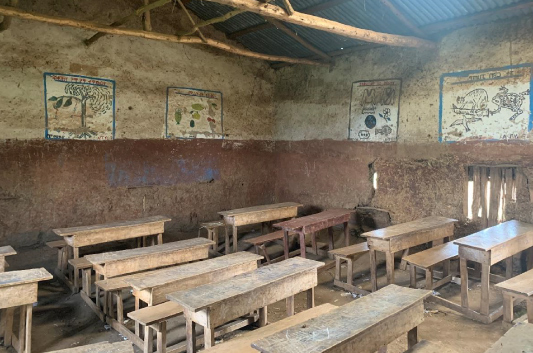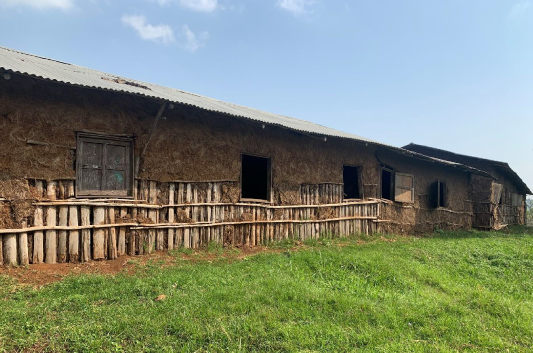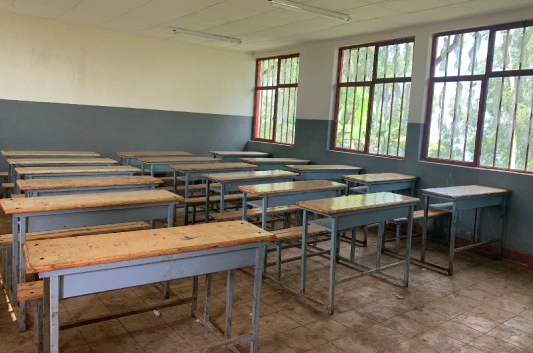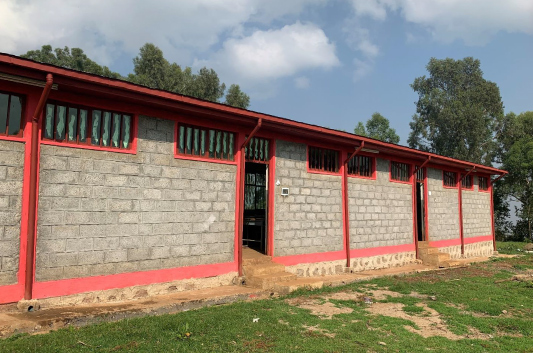

Supporting ActionAid & Its Worldwide Endeavours
June 14, 2023
As an entrepreneur, I know I have to acknowledge that I’ve been extremely fortunate alongside my hard work and dedication. It’s with that good fortune that I made the decision to give back through charitable endeavours, across both local and global projects.
Charity is firmly embedded in everything I do, across both my corporate and personal life. It’s an integral part of perpetuating my belief in a People First culture, and ensures that those in difficult situations can receive the help they need.
Since becoming part of ActionAid’s Change Makers Club almost 10 years ago, I’ve continually supported the charity’s essential work across the globe, and especially so for underprivileged young women and girls across Africa and, more recently, the people of Ukraine.
It’s with that in mind that I’d like to bring you an update across the large-scale projects I’ve chosen to invest in through ActionAid, and how the continued funding from myself and other philanthropists has led to huge positive changes.
Responding To The Humanitarian Crisis In Northern Ethiopia
There’s been continued tensions and ongoing conflict across the northern reaches of Ethiopia, and specifically across the Tigray, Afar and Amhara regions, all of which lie just north of the capital Addis Ababa.
With the death toll now rising to the thousands, and almost 3 million displaced from their homes and livelihoods, there’s been a significant surge in the humanitarian needs of the region. ActionAid’s estimates place this at around 9.4 million people in need of urgent help and support, all compounded by the global pandemic, swarms of locusts, and catastrophic drought.
Over the last 12 to 18 months, conflict across North Ethiopia has only intensified, with relationships along the border between the Tigray and Amhara regions becoming increasingly volatile, and the movement of essential supplies (including clean water, food and medicine) has ground to an almost imperceptible speed.
However, with ActionAid’s continued efforts, those most in need of emergency support have been able to receive the care and attention they were in desperate need of. The latest figures paint an optimistic picture, with:
- 24,042 people provided with multi-purpose cash transfers, ensuring they can purchase food, water and other household essentials.
- 14,886 people supplied with emergency food relief, including wheat flour.
- 9,382 people supplied with water, proper sanitation and hygiene materials, ranging from buckets and wash basins to water treatment chemicals.
- 6,752 women and girls provided with dignity kits that included sanitary pads, underwear and soap to ensure they can manage their menstruation in a dignified and safe way.
ActionAid’s endeavours are only just beginning, too. These figures represent the tip of the iceberg, and with plans to distribute water supplies to over 250,000 people and their livestock, as well as supporting the rebuilding and reshaping of agriculture across the Horn of Africa, the work ActionAid conduct continues to be impactful globally.
Constructing New Classrooms With Changemakers II
One of ActionAid’s more impactful projects, and one that I’m exceptionally proud to have supported in some capacity, is the construction of new classrooms and learning facilities through Changemakers.
Designed to revolutionise the underequipped and often dilapidated education facilities that are available to students across Ethiopia, the Changemakers II project set out initially to contemporise 3 schools across Ethiopia – Gola, Qasha and Dakin.


The impacts of educational projects like these simply cannot be understated. Thanks to the more robust offerings in education, women have begun to become more respected by their peers, and the number of women able to access funding has increased more than sevenfold, from 30 to 219 women.

These benefits represent just the seedlings of change, especially as newer generations grow and learn in a more welcoming environment that better facilitates education and development.

Some of the standout points from that report include:
- Student drop-out rate has reduced by 53%.
- The number of students who need to repeat a year has fallen by 73%.
- An 5% increase in students passing their Grade 8 National exams, which is taken after completing primary school education.
- There’s now more girls in education than boys for the first time ever.
That’s in addition to an increase in capacity at all 3 schools, with the schools now able to take on 2,868 students, up from 2,120 in previous years. Not only does this mean that more people are able to learn, but also that future generations have much greater prospects.
That’s the overwhelmingly positive note on which ActionAid’s latest report ends. It’s with these new buildings and amenities that people’s sons and daughters are growing up with renewed expectations and aspirations, and a reinvigorated hope for a happier and healthier future.
Aiding In The Ukrainian Relief Efforts
ActionAid is exceptionally proud to work alongside the Disasters Emergency Committee (DEC) on some their larger-scale, global relief projects. One of the major efforts in recent months, and unequivocally one of the more prevalent stories in the news, is the relief efforts in Ukraine and its surrounding areas.
In conjunction with the other 15 charities that make up the DEC, there’s been a total of £415 million raised so far, which has since been deployed across multiple different aspects of relief, including:
- Cash – including multi-purpose vouchers and cash for 338,900
- Food – including hot meals and food baskets for 392,000
- Healthcare – 71,000 people supported with primary healthcare, and 37,000 people received mental health support
- Other Humanitarian Relief – Including protection, sheltering, education, and other basic necessities.
- Water – effective sanitation, clean water and hygiene for over 9 million people
Of course, much of this comes with substantial risk for all those involved at the DEC, but there’s been no let-up or reduction of service due to the volatility and precariousness of the situation in Ukraine. It’s continuous support like this that cements the DEC, and its support from ActionAid, as one of the most influential charitable organisations worldwide.
The DEC’s support, as robust as we’ve already seen that its been, didn’t end with these essential services. Protecting the most vulnerable groups of society (such as women and children, the elderly, and those with disabilities) was also a key concern, and with that in mind, the charity set up numerous different initiatives.
The funds raised and collated by the DEC helped establish child protection programmes for unaccompanied children and young crossed over the Moldovan border, as well as an anti-trafficking model used by Romanian policing services.
It’s far-reaching schemes like these that ensure that the Ukrainian people are kept safe, and that they’ve got the support and care they need in these unprecedented times.
Responding To The Cyclone Freddy Crisis
ActionAid has been among the first charities on the ground in the effort to rebuild and replenish in the horrific and devastating aftermath of Cyclone Freddy.
Hailed as one of the most disastrous weather systems in years, and formally recognised as the longest-lasting tropical cyclone in history, Cyclone Freddy decimated significant swathes of Mozambique, Malawi, and Zimbabwe.
While estimates are still uncertain as to the exact figures of those killed or displaced, conservative numbers place this at over 1 million people in Mozambique alone that have been affected significantly by the flooding in the area. That’s expected to rise further, as some areas of Mozambique are still inaccessible due to widespread and severe flooding.
The total numbers are estimated to be closer to 1.5 million people across Malawi and Zimbabwe (in addition to those in Malawi), with the number only expected to rise as reports continue to come through.
ActionAid are already on the ground, providing support and resources to those who’ve been adversely affected, and its efforts like these that are continuing under the radar.